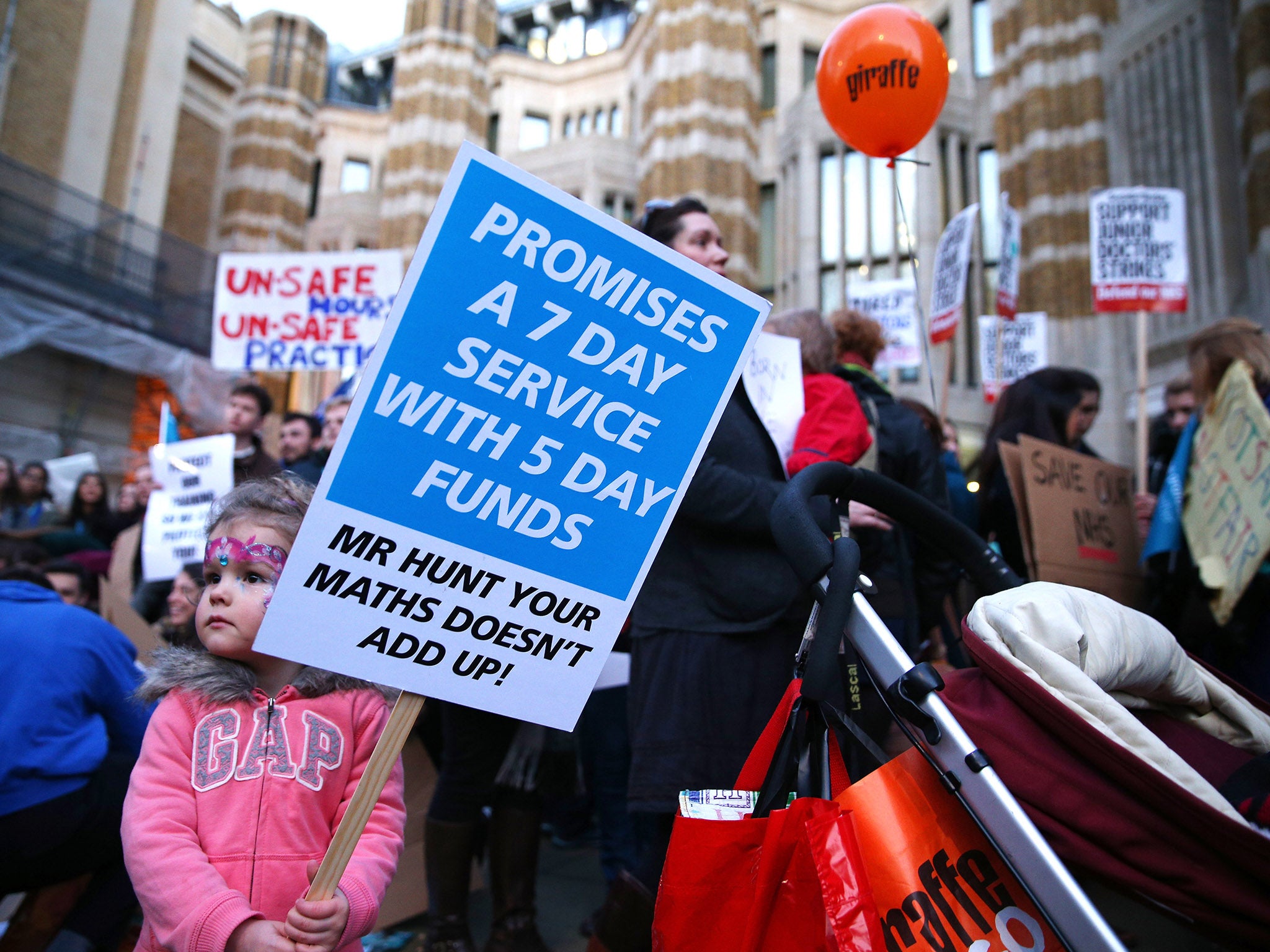What are junior doctors worth to Jeremy Hunt's new NHS? A one-hour Facebook chat - with one hour's notice
Just ten days ago, many junior doctors broke down in tears as Jeremy Hunt announced to the Commons his intention to impose his contract upon them. This response couldn't have been more callous


Your support helps us to tell the story
From reproductive rights to climate change to Big Tech, The Independent is on the ground when the story is developing. Whether it's investigating the financials of Elon Musk's pro-Trump PAC or producing our latest documentary, 'The A Word', which shines a light on the American women fighting for reproductive rights, we know how important it is to parse out the facts from the messaging.
At such a critical moment in US history, we need reporters on the ground. Your donation allows us to keep sending journalists to speak to both sides of the story.
The Independent is trusted by Americans across the entire political spectrum. And unlike many other quality news outlets, we choose not to lock Americans out of our reporting and analysis with paywalls. We believe quality journalism should be available to everyone, paid for by those who can afford it.
Your support makes all the difference.You’ve arrived, with no warning, in a hospital. You may be in pain, bewildered, anxious. Stripped of your clothes and draped in a gown, your mind overrun with questions. Why has this happened to me? What does it mean? Can I trust you? Will it hurt? Will it kill me?
For patients, perhaps more than anyone, the unknown can be terrifying. And a doctor or nurse who can speak clearly and honestly may extend a lifeline to those overwhelmed with fear.
Effective communication, in short, is the bedrock of good medicine. Which is why emotions ran high last night when the group NHS Employers invited junior doctors to partake in a “Facebook chat” about the planned imposition of the government’s new junior contract.
Note: this was chat of an hour’s duration, and offered at only one hour’s notice.
Small wonder social media erupted in fury. ‘The infantilisation of our profession continues with a #FarcebookChat,” tweeted one doctor, adding, “How NOT to allay the concerns of an entire profession”.
The context here is key. Just ten days ago, many junior doctors broke down in tears as Jeremy Hunt announced to the Commons his intention to impose his contract upon them.
And now, to add insult to injury, the NHS’s response to the most important change in the working terms and conditions of doctors in decades has been not been face-to-face meetings, or personal responses to phone calls and emails, but this – a seeming social media stunt as ill-conceived as it has been counterproductive.
What NHS Employers has failed to appreciate is that, for us, the contract debacle is no political game. We see the government’s attempt to eke seven days’ work out of a workforce sized for five as both disingenuous and dangerous. We believe the ‘truly seven day NHS’ – as yet undefined, uncosted and unstaffed – threatens our patients as much as it does us, and therefore we could not be more opposed to its politically-driven imposition.
You might think that, having alienated and insulted a whole generation of doctors, the government and Department of Health would now at least attempt genuine engagement. But sixty minutes of Facebook chat do not, quite frankly, cut it.
As a tutor in communication skills for Oxford University’s Medical School, I’ve reflected long and hard on how to communicate effectively. In general, I’m afraid, electronic communication smacks of arm’s-length disengagement.
That’s not to say face-to-face is always perfect. I remember all too well a consultant surgeon breaking the bad news to a patient of his terminal cancer by turning to his entourage and muttering, perfectly audibly, “Get a palliative care nurse to come and see him.” Grotesquely incompetent communication in action.
The evidence shows that doctors who are poor communicators are more likely to be sued by patients and relatives. One Lancet study of patients and relatives taking legal action stated: “Intense emotions were aroused and continued to be felt for a long time. The decision to take legal action was determined not only by the original injury, but also by insensitive handling and poor communication after the original incident.”2
Right now, our emotions are intense. We feel stamped on by the government, and sincere and meaningful attempts to engage with us may help take the sting out of this toxic stand-off between doctor and government.
What is guaranteed only to inflame doctors is half-baked, insincere, online attempts to pay lip service to engagement while keeping doctors at a distance.
For the man whose door is always open, isn’t it about time Jeremy Hunt let us in?
Join our commenting forum
Join thought-provoking conversations, follow other Independent readers and see their replies
Comments